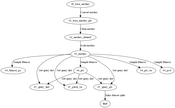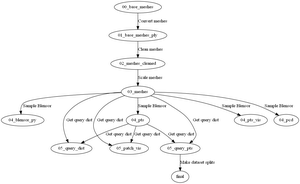Information
- Publication Type: Bachelor Thesis
- Workgroup(s)/Project(s):
- Date: August 2020
- Date (Start): 2. April 2020
- Date (End): 5. August 2020
- Matrikelnummer: 1634877
- First Supervisor: Philipp Erler
- Keywords: dataset generation, framework, surface reconstruction
Abstract
The aim of this bachelor thesis is the development of a Python framework. The main task for this framework is the generation of datasets, which can be further used for surface reconstruction. They are needed for training a neural network, which is then able to reconstruct meshes on its own given a point cloud of a mesh. In order to optimize the training of the neural network, a lot of training data is needed. This framework utilizes multi-processing to achieve a faster generation process in comparison to sequentially generating one mesh after another.In addition, the framework is also able to handle any kind of similar pipeline. The user is able to define the steps of such pipeline in an XML document, which then can make calls to arbitrary programs. This fact makes the framework an all-purpose tool for any kind of task that needs to process a lot of data independent from each other.
The results show a great performance increase when generating datasets. This can be seen in the benchmarks that have been done. The time of execution for a fixed amount of files has been measured with different modes of execution. The custom process pool we developed shows a faster time overall compared to using Python's process pool for each step of the pipeline independently. It is also way faster in comparison to running every step for each file sequentially.
Additional Files and Images
Additional images and videos
 teaser:
The processing steps of the dataset generation shown as a graph.
teaser:
The processing steps of the dataset generation shown as a graph.
Additional files
Weblinks
No further information available.BibTeX
@bachelorsthesis{riegler_2020_framework,
title = "High-Performance Framework for Dataset Generation",
author = "Maximilian Riegler",
year = "2020",
abstract = "The aim of this bachelor thesis is the development of a
Python framework. The main task for this framework is the
generation of datasets, which can be further used for
surface reconstruction. They are needed for training a
neural network, which is then able to reconstruct meshes on
its own given a point cloud of a mesh. In order to optimize
the training of the neural network, a lot of training data
is needed. This framework utilizes multi-processing to
achieve a faster generation process in comparison to
sequentially generating one mesh after another. In
addition, the framework is also able to handle any kind of
similar pipeline. The user is able to define the steps of
such pipeline in an XML document, which then can make calls
to arbitrary programs. This fact makes the framework an
all-purpose tool for any kind of task that needs to process
a lot of data independent from each other. The results show
a great performance increase when generating datasets. This
can be seen in the benchmarks that have been done. The time
of execution for a fixed amount of files has been measured
with different modes of execution. The custom process pool
we developed shows a faster time overall compared to using
Python's process pool for each step of the pipeline
independently. It is also way faster in comparison to
running every step for each file sequentially.",
month = aug,
address = "Favoritenstrasse 9-11/E193-02, A-1040 Vienna, Austria",
school = "Research Unit of Computer Graphics, Institute of Visual
Computing and Human-Centered Technology, Faculty of
Informatics, TU Wien ",
keywords = "dataset generation, framework, surface reconstruction",
URL = "https://www.cg.tuwien.ac.at/research/publications/2020/riegler_2020_framework/",
}


